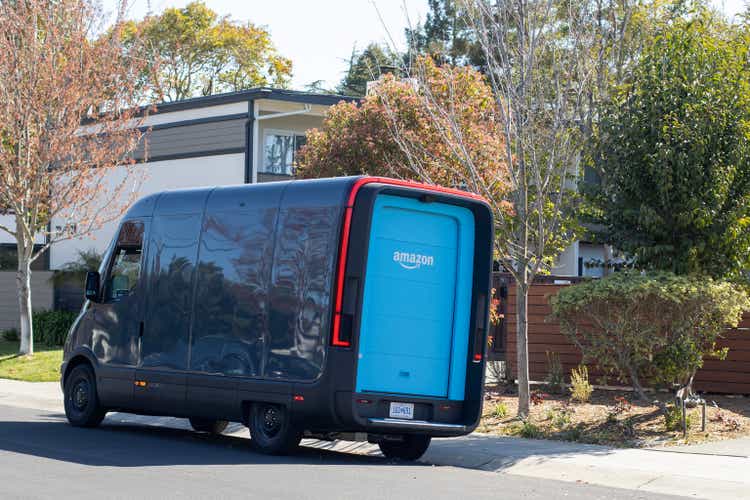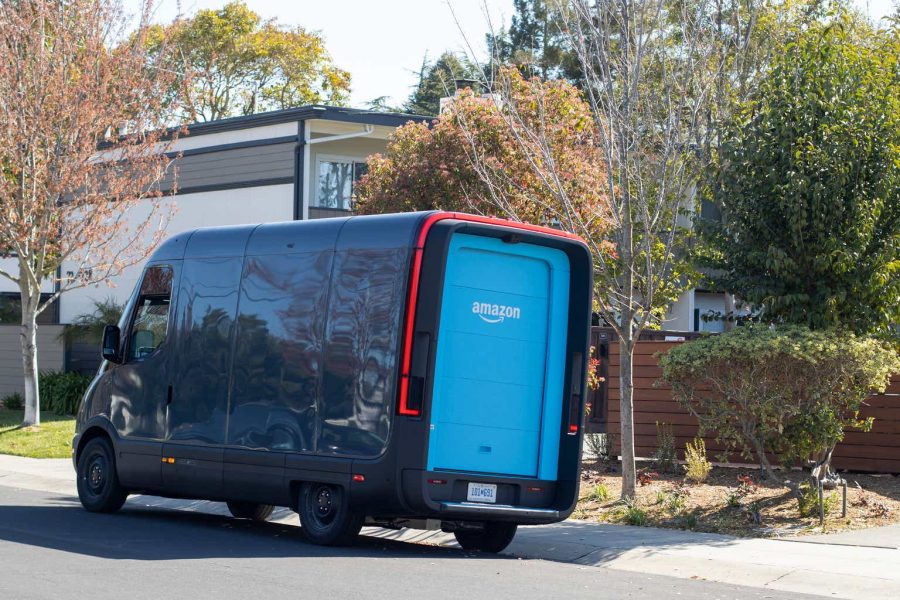Summary:
- Rivian faces significant challenges from high cash burn and competition from Tesla, yet Amazon’s substantial investment and strategic interest may bolster its long-term viability.
- Rivian’s alignment with Amazon’s sustainability goals and potential growth in the use of Rivian’s EVs for Amazon’s deliveries underpin the partnership, which means Rivian could thrive over the long term.
- Rivian stock remains a speculative investment at this time, with high levels of uncertainty. Investors should not consider investing a large portion of their portfolio.
hapabapa/iStock Editorial via Getty Images
I Think Rivian Will Survive
Some analysts have raised concerns that Rivian (NASDAQ:RIVN) might not survive 2025/2026 due to a high level of cash burn, no profit, and not enough cash on hand to sustain it. These concerns are valid, and there are rising pressures from lower vehicle prices from Tesla (TSLA) which are significantly gutting the future potential of other EV makers, most notably unprofitable EV firms like Rivian. I think the near future is going to be incredibly difficult for Rivian, and I believe that management may be wise to take a leaf out of Elon Musk’s book by knuckling down further on operational efficiency and lowering costs. Failure to do this significantly could see the firm end up bankrupt in the next few years, depending on whether or not it can successfully raise more debt. If the company closes in on extremely tight cash reserves, equity raising will become less viable due to significantly weakened investor sentiment.
In the near term, investors have hope from Q1 earnings, where Rivian founder RJ Scaringe declared the following:
First-quarter results exceeded our outlook and set a strong foundation for the remainder of the year as we focus on continued demand generation, delivering cost and plant efficiency improvements, advancing R2 development, and driving towards profitability.
Core points of optimism included the company reiterating its path to a modest gross profit in Q4 2024 and that the best-selling EV in the US above $70,000 in Q1 2024 was Rivian’s R1S. However, the company did miss its EPS GAAP and normalized consensus estimates by -$0.21 and -$0.07, respectively. Therefore, I think this helps to outline what I will discuss in detail below. In the short-to-medium term, expect volatility, but over the long term, there is significant upside potential, albeit at high risk.
Many readers will know that Amazon (AMZN) invested substantially in Rivian over multiple rounds. Therefore, I think that Amazon’s vested interest in Rivian and also its commitment to long-term environmental sustainability efforts could see the conglomerate taking more of an active role in guiding Rivian in the future, even potentially sustaining it with additional capital. I believe that Rivian’s future isn’t as bleak as some short-term investors think if we can zoom out and look at the broader picture over a longer time horizon. I think that an investment in Rivian comes with a lot of risk, but due to the lower valuation at this time, which includes a price-to-sales ratio of below 2, investors might want to consider how lucrative the investment bought at this time might be if Rivian manages to pull through this difficult period into stable, long-term profitability. The odds look low to many analysts, and I think their caution is justified. However, a small, risk-mitigated allocation to Rivian with a long-term ethos in mind has great outsized potential, in my opinion.
Amazon Didn’t Invest In Rivian For Nothing
In my opinion, Rivian could be the beneficiary of continued high growth in electric vehicle demand. I do not think ESG initiatives are going away, particularly as it relates to the adoption of electric transportation. I believe that, over the long term, electric vehicles will fully replace fossil fuel cars, and while Tesla is the ultimate pioneer in this regard, I find it highly unlikely that Amazon is going to buy its future autonomous electric vans for delivery from Tesla. Instead, it is going to get them from Rivian, which is why it made the investment in the first place. I think the lesson here for investors to realize is that Amazon’s executive team is notably wise. They quite clearly hold the long-term ethos that was instilled in the company by founder Jeff Bezos. Investors who do not understand Amazon’s long-term strategy may not understand the value of Rivian to Amazon as it continues to implement climate-friendly practices and higher levels of autonomous driving into its delivery fleets.
Rivian is actively working on developing autonomous driving technologies, including full self-driving. Rivian’s advanced driver assistance system is known as Rivian Driver+. While not fully autonomous, Amazon’s deal with Rivian for 100,000 electric delivery vans is likely to include vans equipped to support future integration of fully autonomous driving technology. Tesla cannot be the only big player in the autonomous driving space. I believe Tesla in the future is likely to capture the market in autonomous taxis, potentially as the dominant provider due to its scale of focus on automotive compared to companies like Waymo, a subsidiary of Alphabet (GOOGL) (GOOG). However, Rivian’s time to shine has really not yet arrived on this front. I do not believe it will try to corner the robotaxi market; there is already too much competition. The shrewd strategy to take, which seems in line with management’s actions thus far, would be for Rivian to focus on keeping its commercial cars competitive with autonomous assistance and eventually full self-driving and then to go all-in on being an exceptional provider of quality for Amazon in delivery vans, cornering a vast and very significant part of the autonomous vehicle market in the future, considering Amazon is the largest digital retail marketplace and delivery service in the world. Perhaps other analysts have not realized that Amazon is so invested in this. For Rivian to go bankrupt indicates that Amazon has been so careless to let billions of dollars of its investment in the company just slide off the table: not likely for a company with such an impeccable track record like Amazon, especially when the investment relates so significantly to such an important future development for its margin expansion in relationship to AI-use in its delivery services.
The Risk Remains High Even Over The Long Term
While my above commentary is clearly optimistic, I have rated the investment a Hold at this time because I do believe it comes with more risk than I am happy to take on at a large scale. Similar to Amazon, which invested just a fraction of its total capital base in Rivian, I am considering investing just a small percentage of my total portfolio in the company to see if it delivers outsized future alpha. I believe there is enough potential that it could deliver this.
However, events could also transpire that leave Rivian underserved by Amazon. I believe it isn’t out of the question that Amazon sees its plan with Rivian to be slightly overvalued, and Amazon is known for being highly agile, divesting and shifting accordingly with changes in demand, and long-term strategy adjustments. If autonomous delivery becomes less of a driving force for Amazon in the future, it could divest its shares in Rivian. I find this unlikely, but I believe investors should consider the worst possible outcome.
In addition, I think it is possible that in the next five years, the shares won’t do much. I think that to really see the results from Rivian, investors need to commit for 10 years to begin to see how the relationship between Amazon and Rivian has evolved. Autonomous driving takes an awful amount of time to get to market, including a lot of regulatory pressures. There are also many different logistical issues to navigate, including package delivery once a van is at the delivery site. Let’s look at it another way: perhaps Amazon will find that it develops a much better drone system that can deliver larger packages, significantly reducing the future value it may have with Rivian. In addition, it may find that it always needs a human driver for delivery purposes, which would also significantly reduce the long-term value of a relationship with Rivian. The outcome of these issues won’t be clear in 3-5 years, and investors are likely just to be trading on price, value, and market sentiment over that time frame. To assess the real results will take up to 10 years or more, in my opinion, because a significant element of Rivian’s long-term returns is going to come from developments in the utility of Rivian technology and vehicles in partnership with Amazon, which should help to drive Rivian’s core business of commercial vehicles, with profitability perhaps beginning to stabilize.
Key Elements
Rivian is a high-reward, high-risk speculative investment grounded in partnership with Amazon. I believe that the company is going to face near-term pressures from undercut prices from Elon Musk’s Tesla, but also from Rivian’s lack of profitability, even at the gross level, which is leading to a likely new level of debt financing.
Amazon didn’t invest in Rivian for nothing. To consider that it would leave billions of dollars of its investment on the table seems irrational to me. I believe that Amazon has a significant long-term plan for Rivian, which it will begin to operate more aggressively with at the right time.
I believe that even given the potential long-term success of Rivian, investors need to prepare for the worst. I am personally considering investing, but at no more than 3% of my total portfolio value. In doing this, I am taking a leaf out of Amazon’s book. In my opinion, it is irrational to bet a large portion of your capital base on Rivian.
Analyst’s Disclosure: I/we have a beneficial long position in the shares of AMZN, TSLA, GOOGL either through stock ownership, options, or other derivatives. I wrote this article myself, and it expresses my own opinions. I am not receiving compensation for it (other than from Seeking Alpha). I have no business relationship with any company whose stock is mentioned in this article.
Seeking Alpha’s Disclosure: Past performance is no guarantee of future results. No recommendation or advice is being given as to whether any investment is suitable for a particular investor. Any views or opinions expressed above may not reflect those of Seeking Alpha as a whole. Seeking Alpha is not a licensed securities dealer, broker or US investment adviser or investment bank. Our analysts are third party authors that include both professional investors and individual investors who may not be licensed or certified by any institute or regulatory body.
